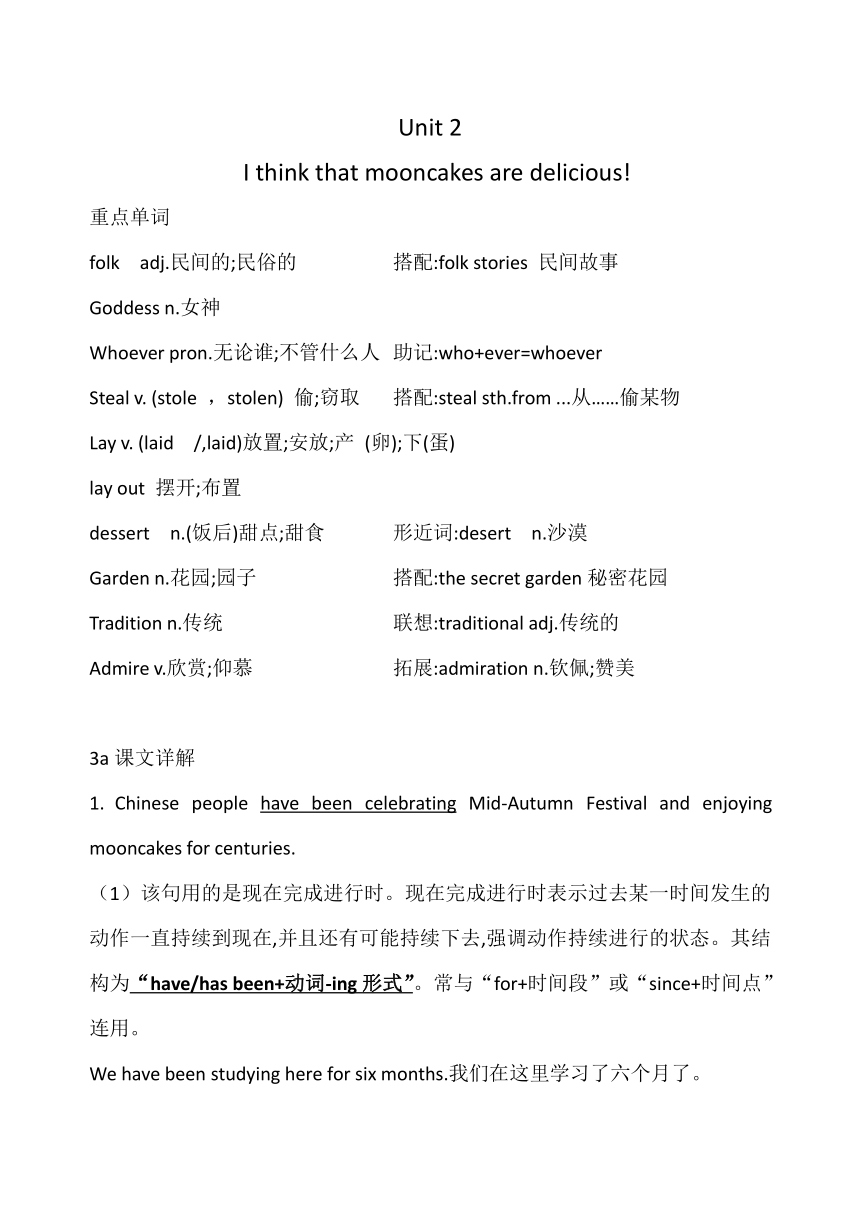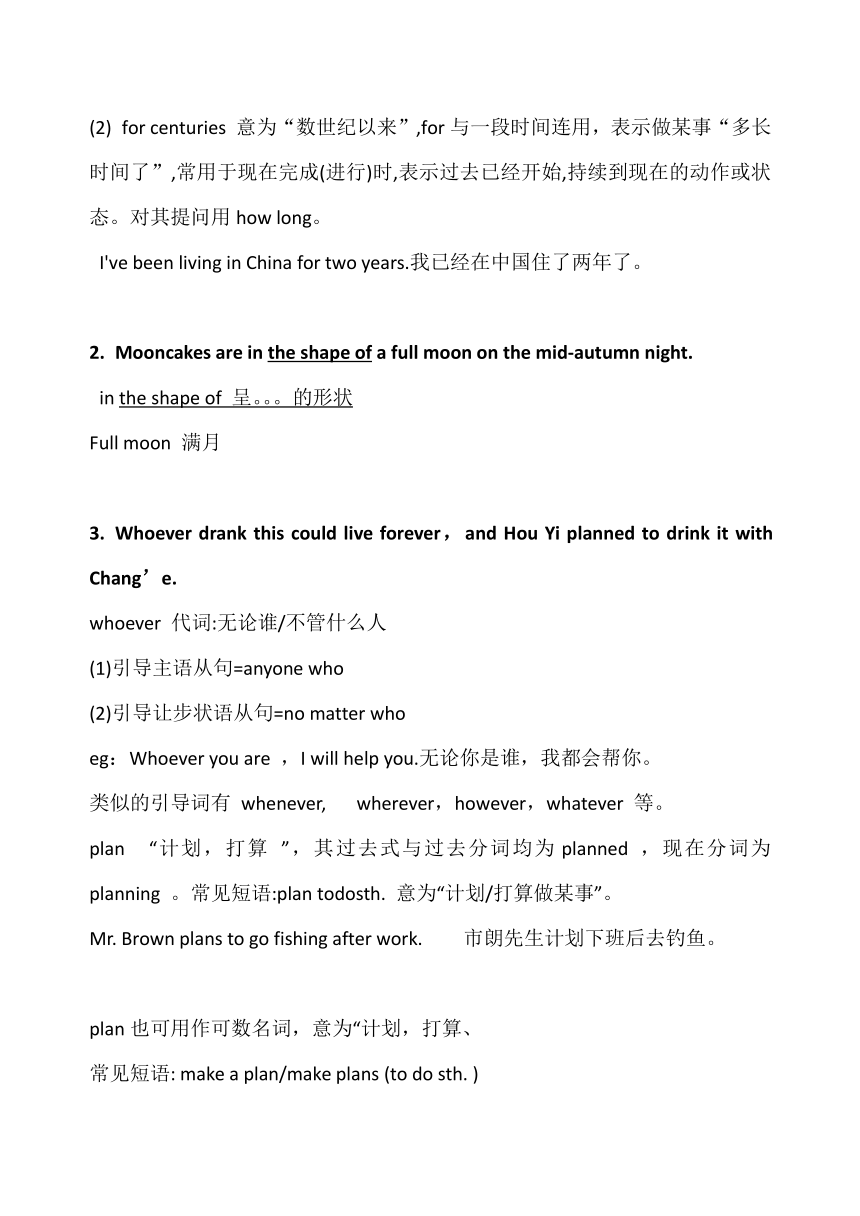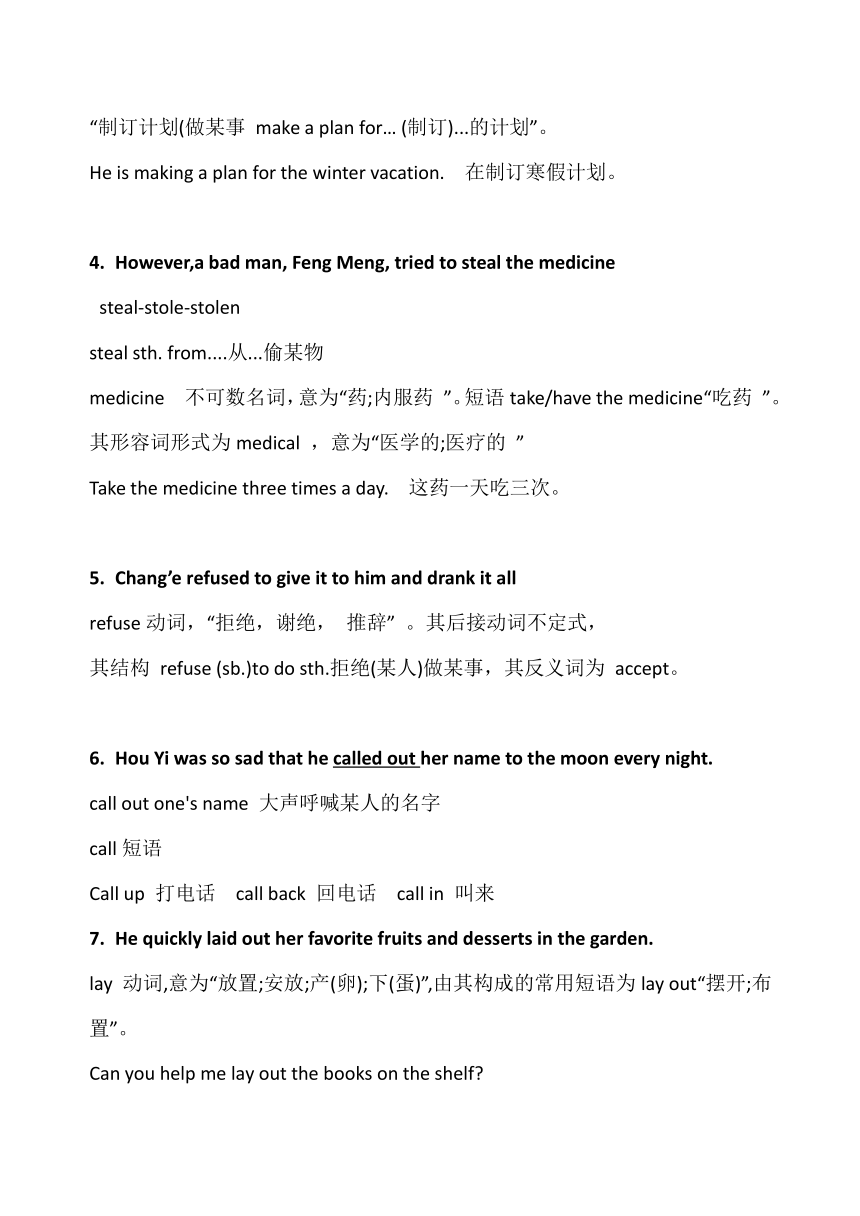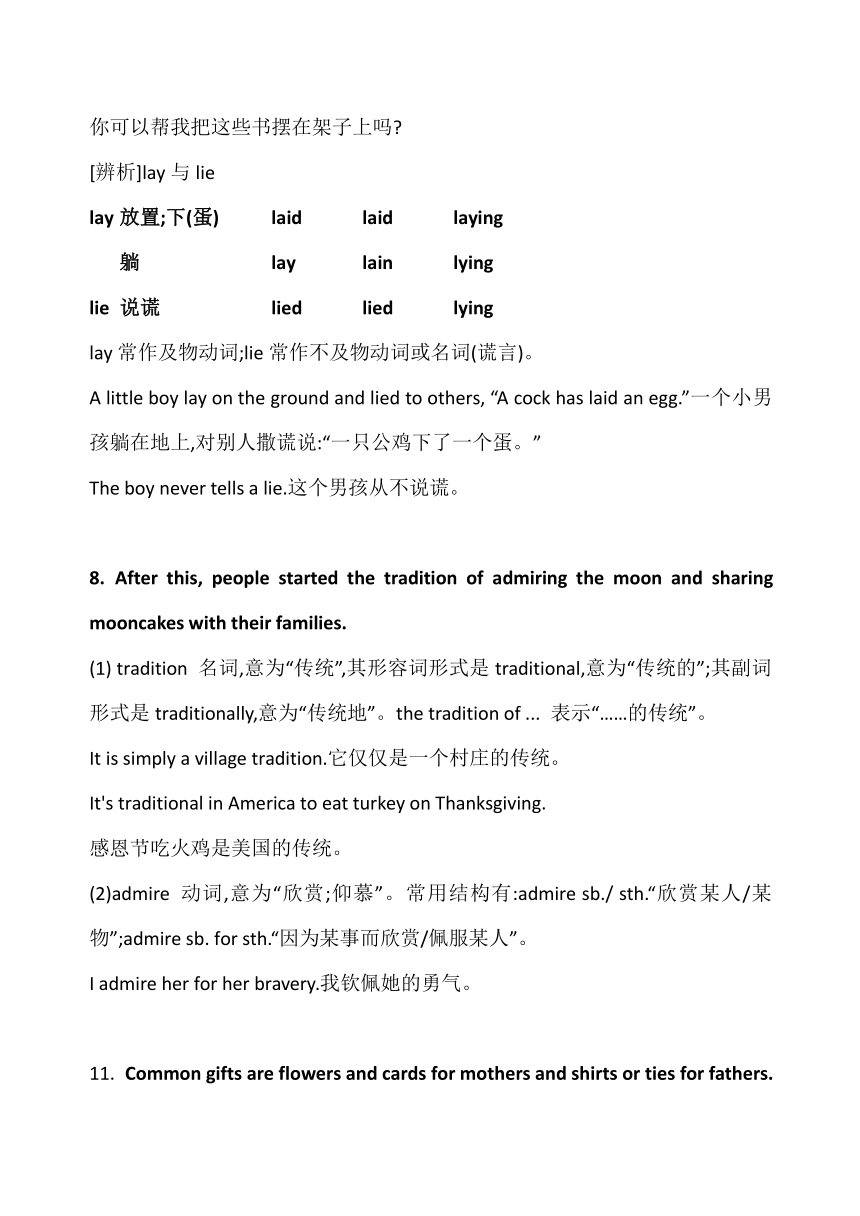Unit 2 I think that mooncakes are delicious! Section A 3a 语法(含答案) 2024-2025学年人教版九年级英语全册
文档属性
| 名称 | Unit 2 I think that mooncakes are delicious! Section A 3a 语法(含答案) 2024-2025学年人教版九年级英语全册 |  | |
| 格式 | docx | ||
| 文件大小 | 24.7KB | ||
| 资源类型 | 教案 | ||
| 版本资源 | 人教新目标(Go for it)版 | ||
| 科目 | 英语 | ||
| 更新时间 | 2024-09-03 18:14:12 | ||
图片预览




文档简介
Unit 2
I think that mooncakes are delicious!
重点单词
folk adj.民间的;民俗的 搭配:folk stories 民间故事
Goddess n.女神
Whoever pron.无论谁;不管什么人 助记:who+ever=whoever
Steal v. (stole ,stolen) 偷;窃取 搭配:steal sth.from ...从……偷某物
Lay v. (laid /,laid)放置;安放;产 (卵);下(蛋)
lay out 摆开;布置
dessert n.(饭后)甜点;甜食 形近词:desert n.沙漠
Garden n.花园;园子 搭配:the secret garden秘密花园
Tradition n.传统 联想:traditional adj.传统的
Admire v.欣赏;仰慕 拓展:admiration n.钦佩;赞美
3a课文详解
Chinese people have been celebrating Mid-Autumn Festival and enjoying mooncakes for centuries.
(1)该句用的是现在完成进行时。现在完成进行时表示过去某一时间发生的动作一直持续到现在,并且还有可能持续下去,强调动作持续进行的状态。其结构为“have/has been+动词-ing形式”。常与“for+时间段”或“since+时间点”连用。
We have been studying here for six months.我们在这里学习了六个月了。
for centuries 意为“数世纪以来”,for与一段时间连用,表示做某事“多长时间了”,常用于现在完成(进行)时,表示过去已经开始,持续到现在的动作或状态。对其提问用how long。
I've been living in China for two years.我已经在中国住了两年了。
Mooncakes are in the shape of a full moon on the mid-autumn night.
in the shape of 呈。。。的形状
Full moon 满月
Whoever drank this could live forever,and Hou Yi planned to drink it with Chang’e.
whoever 代词:无论谁/不管什么人
(1)引导主语从句=anyone who
(2)引导让步状语从句=no matter who
eg:Whoever you are ,I will help you.无论你是谁,我都会帮你。
类似的引导词有 whenever, wherever,however,whatever 等。
plan “计划,打算 ”,其过去式与过去分词均为planned ,现在分词为 planning 。常见短语:plan todosth. 意为“计划/打算做某事”。
Mr. Brown plans to go fishing after work. 市朗先生计划下班后去钓鱼。
plan也可用作可数名词,意为“计划,打算、
常见短语: make a plan/make plans (to do sth. )
“制订计划(做某事 make a plan for… (制订)...的计划”。
He is making a plan for the winter vacation. 在制订寒假计划。
However,a bad man, Feng Meng, tried to steal the medicine
steal-stole-stolen
steal sth. from....从...偷某物
medicine 不可数名词,意为“药;内服药 ”。短语take/have the medicine“吃药 ”。
其形容词形式为medical ,意为“医学的;医疗的 ”
Take the medicine three times a day. 这药一天吃三次。
Chang’e refused to give it to him and drank it all
refuse动词,“拒绝,谢绝, 推辞” 。其后接动词不定式,
其结构 refuse (sb.)to do sth.拒绝(某人)做某事,其反义词为 accept。
Hou Yi was so sad that he called out her name to the moon every night.
call out one's name 大声呼喊某人的名字
call短语
Call up 打电话 call back 回电话 call in 叫来
He quickly laid out her favorite fruits and desserts in the garden.
lay 动词,意为“放置;安放;产(卵);下(蛋)”,由其构成的常用短语为lay out“摆开;布置”。
Can you help me lay out the books on the shelf
你可以帮我把这些书摆在架子上吗
[辨析]lay与lie
lay 放置;下(蛋) laid laid laying
躺 lay lain lying
lie 说谎 lied lied lying
lay常作及物动词;lie常作不及物动词或名词(谎言)。
A little boy lay on the ground and lied to others, “A cock has laid an egg.”一个小男孩躺在地上,对别人撒谎说:“一只公鸡下了一个蛋。”
The boy never tells a lie.这个男孩从不说谎。
After this, people started the tradition of admiring the moon and sharing mooncakes with their families.
(1) tradition 名词,意为“传统”,其形容词形式是traditional,意为“传统的”;其副词形式是traditionally,意为“传统地”。the tradition of ... 表示“……的传统”。
It is simply a village tradition.它仅仅是一个村庄的传统。
It's traditional in America to eat turkey on Thanksgiving.
感恩节吃火鸡是美国的传统。
(2)admire 动词,意为“欣赏;仰慕”。常用结构有:admire sb./ sth.“欣赏某人/某物”;admire sb. for sth.“因为某事而欣赏/佩服某人”。
I admire her for her bravery.我钦佩她的勇气。
Common gifts are flowers and cards for mothers and shirts or ties for fathers.常见的礼物有为母亲准备的花和卡片,以及为父亲准备的衬衣或领带。
tie 名词,意为“领带”。
tie 还可作及物动词,意为“捆;束”。
She tied the newspapers in a bundle她把报纸扎成一捆。
I wear a shirt and tie at work. 我上班时穿衬衫打领带。
[拓展] When you come to the end of your rope, tie a knot and hang on!
当你命悬一线时,打个结,挺住!
12. Actually, we don't have to spend a lot of money.事实上,我们不必花很多钱
spend 动词,意为“用,花”,可表示花费时间或金钱。
I spent two hours (in) reading the novel.
我花了两个小时读这篇小说。
I spent 100 yuan on the sweater.我花了100元买这件毛衣。
[辨析]spend,pay,cost与take 表示“花费”时的常用句型
spend人 sb.
spend(s) some time/money on sth. sb.
spend(s) some time (in)/money (on) doing sth.
pay 人 sb. pay(s) some money for sth.
cost 物 sth. cost(s) sb. some money.
take it It takes/took sb. some time to do sth.
练习:
I spent ninety yuan buying the gift.
=I spent ninety yuan on the gift.
=I paid ninety yuan for the gift.
=The gift cost me ninety yuan.这件礼物花了我九十元钱。
13.as a result, chang’e become light and flew up to the sky.
As a result of= because of 因为由于
Flew up to 飞向。。。
语法集锦
一、that、if 和 whether引导的宾语从句
在复合句中作宾语的从句叫宾语从句。引导宾语从句的常见连接词有that、if、whether、who、what、where、why和how等。
1.引导宾语从句的连接词
that 引导的宾语从句是由陈述句转化而来的,主句的谓语动词多是think、believe、guess、know、say、hope等。在口语或非正式文体中that常省略
whether/if引导的宾语从句多是由一般疑问句或选择疑问句转化而来的。通常,whether与if可以互换使用,它们在从句中不可省略
I think (that) he is right.我认为他是对的。
We believe that it is a good way to relax.我们相信这是一种很好的放松方式。
只用 whether 不用if的三种情况
①与 or not 直接连用时
I don't know whether or not the star will come. 我不知道那位明星是否会来。
②与动词不定式连用时
Mr. Li will tell us whether to have a test.李老师将告诉我们是否进行测试。
③作介词的宾语时
Everything depends on whether we have enough time.一切都取决于我们是否有足够的时间。
2.宾语从句的时态
(1)若主句为一般现在时,从句可选择任何合适的时态。
I'm sorry to hear that you are ill.听说你病了,我很难过。
(2)若主句是一般过去时,从句一般要用过去的某种时态。
She didn't know that Tom had left for Shanghai.她不知道汤姆已经去了上海。
当宾语从句所表达的是客观事实或规律时,无论主句是何种时态,宾语从句都要用一般现在时!
3.宾语从句的语序。
在宾语从句中要用陈述语序。
Can you tell me how I can get to the park 你能告诉我怎样到达公园吗
综合练习
Hello,this is Dick. Can I speak to Peter
-Hold on, please. I'll see____ he's in.
A. as soon as B.if C. until D. that
2. Could you tell me _______a meeting next week
A. if there was going to be B. if there is going to be
C. whether is there going to be D. whether there is going to have
3. I don't know _______she could finish the work by the end of this month.
A. whether B.what C.when D.that
4.-What did your father say to you just now
He asked me____.
that I would like to see a movie B. where I will spend my holiday
C. if I enjoyed myself at the party D.when did I attend the graduation party
5.一Are you going camping this afternoon
一A typhoon is coming. I'm not sure ______the road to the mountains will be closed.
A. which B.what C.whether D.why
(答案:BBACC)
I think that mooncakes are delicious!
重点单词
folk adj.民间的;民俗的 搭配:folk stories 民间故事
Goddess n.女神
Whoever pron.无论谁;不管什么人 助记:who+ever=whoever
Steal v. (stole ,stolen) 偷;窃取 搭配:steal sth.from ...从……偷某物
Lay v. (laid /,laid)放置;安放;产 (卵);下(蛋)
lay out 摆开;布置
dessert n.(饭后)甜点;甜食 形近词:desert n.沙漠
Garden n.花园;园子 搭配:the secret garden秘密花园
Tradition n.传统 联想:traditional adj.传统的
Admire v.欣赏;仰慕 拓展:admiration n.钦佩;赞美
3a课文详解
Chinese people have been celebrating Mid-Autumn Festival and enjoying mooncakes for centuries.
(1)该句用的是现在完成进行时。现在完成进行时表示过去某一时间发生的动作一直持续到现在,并且还有可能持续下去,强调动作持续进行的状态。其结构为“have/has been+动词-ing形式”。常与“for+时间段”或“since+时间点”连用。
We have been studying here for six months.我们在这里学习了六个月了。
for centuries 意为“数世纪以来”,for与一段时间连用,表示做某事“多长时间了”,常用于现在完成(进行)时,表示过去已经开始,持续到现在的动作或状态。对其提问用how long。
I've been living in China for two years.我已经在中国住了两年了。
Mooncakes are in the shape of a full moon on the mid-autumn night.
in the shape of 呈。。。的形状
Full moon 满月
Whoever drank this could live forever,and Hou Yi planned to drink it with Chang’e.
whoever 代词:无论谁/不管什么人
(1)引导主语从句=anyone who
(2)引导让步状语从句=no matter who
eg:Whoever you are ,I will help you.无论你是谁,我都会帮你。
类似的引导词有 whenever, wherever,however,whatever 等。
plan “计划,打算 ”,其过去式与过去分词均为planned ,现在分词为 planning 。常见短语:plan todosth. 意为“计划/打算做某事”。
Mr. Brown plans to go fishing after work. 市朗先生计划下班后去钓鱼。
plan也可用作可数名词,意为“计划,打算、
常见短语: make a plan/make plans (to do sth. )
“制订计划(做某事 make a plan for… (制订)...的计划”。
He is making a plan for the winter vacation. 在制订寒假计划。
However,a bad man, Feng Meng, tried to steal the medicine
steal-stole-stolen
steal sth. from....从...偷某物
medicine 不可数名词,意为“药;内服药 ”。短语take/have the medicine“吃药 ”。
其形容词形式为medical ,意为“医学的;医疗的 ”
Take the medicine three times a day. 这药一天吃三次。
Chang’e refused to give it to him and drank it all
refuse动词,“拒绝,谢绝, 推辞” 。其后接动词不定式,
其结构 refuse (sb.)to do sth.拒绝(某人)做某事,其反义词为 accept。
Hou Yi was so sad that he called out her name to the moon every night.
call out one's name 大声呼喊某人的名字
call短语
Call up 打电话 call back 回电话 call in 叫来
He quickly laid out her favorite fruits and desserts in the garden.
lay 动词,意为“放置;安放;产(卵);下(蛋)”,由其构成的常用短语为lay out“摆开;布置”。
Can you help me lay out the books on the shelf
你可以帮我把这些书摆在架子上吗
[辨析]lay与lie
lay 放置;下(蛋) laid laid laying
躺 lay lain lying
lie 说谎 lied lied lying
lay常作及物动词;lie常作不及物动词或名词(谎言)。
A little boy lay on the ground and lied to others, “A cock has laid an egg.”一个小男孩躺在地上,对别人撒谎说:“一只公鸡下了一个蛋。”
The boy never tells a lie.这个男孩从不说谎。
After this, people started the tradition of admiring the moon and sharing mooncakes with their families.
(1) tradition 名词,意为“传统”,其形容词形式是traditional,意为“传统的”;其副词形式是traditionally,意为“传统地”。the tradition of ... 表示“……的传统”。
It is simply a village tradition.它仅仅是一个村庄的传统。
It's traditional in America to eat turkey on Thanksgiving.
感恩节吃火鸡是美国的传统。
(2)admire 动词,意为“欣赏;仰慕”。常用结构有:admire sb./ sth.“欣赏某人/某物”;admire sb. for sth.“因为某事而欣赏/佩服某人”。
I admire her for her bravery.我钦佩她的勇气。
Common gifts are flowers and cards for mothers and shirts or ties for fathers.常见的礼物有为母亲准备的花和卡片,以及为父亲准备的衬衣或领带。
tie 名词,意为“领带”。
tie 还可作及物动词,意为“捆;束”。
She tied the newspapers in a bundle她把报纸扎成一捆。
I wear a shirt and tie at work. 我上班时穿衬衫打领带。
[拓展] When you come to the end of your rope, tie a knot and hang on!
当你命悬一线时,打个结,挺住!
12. Actually, we don't have to spend a lot of money.事实上,我们不必花很多钱
spend 动词,意为“用,花”,可表示花费时间或金钱。
I spent two hours (in) reading the novel.
我花了两个小时读这篇小说。
I spent 100 yuan on the sweater.我花了100元买这件毛衣。
[辨析]spend,pay,cost与take 表示“花费”时的常用句型
spend人 sb.
spend(s) some time/money on sth. sb.
spend(s) some time (in)/money (on) doing sth.
pay 人 sb. pay(s) some money for sth.
cost 物 sth. cost(s) sb. some money.
take it It takes/took sb. some time to do sth.
练习:
I spent ninety yuan buying the gift.
=I spent ninety yuan on the gift.
=I paid ninety yuan for the gift.
=The gift cost me ninety yuan.这件礼物花了我九十元钱。
13.as a result, chang’e become light and flew up to the sky.
As a result of= because of 因为由于
Flew up to 飞向。。。
语法集锦
一、that、if 和 whether引导的宾语从句
在复合句中作宾语的从句叫宾语从句。引导宾语从句的常见连接词有that、if、whether、who、what、where、why和how等。
1.引导宾语从句的连接词
that 引导的宾语从句是由陈述句转化而来的,主句的谓语动词多是think、believe、guess、know、say、hope等。在口语或非正式文体中that常省略
whether/if引导的宾语从句多是由一般疑问句或选择疑问句转化而来的。通常,whether与if可以互换使用,它们在从句中不可省略
I think (that) he is right.我认为他是对的。
We believe that it is a good way to relax.我们相信这是一种很好的放松方式。
只用 whether 不用if的三种情况
①与 or not 直接连用时
I don't know whether or not the star will come. 我不知道那位明星是否会来。
②与动词不定式连用时
Mr. Li will tell us whether to have a test.李老师将告诉我们是否进行测试。
③作介词的宾语时
Everything depends on whether we have enough time.一切都取决于我们是否有足够的时间。
2.宾语从句的时态
(1)若主句为一般现在时,从句可选择任何合适的时态。
I'm sorry to hear that you are ill.听说你病了,我很难过。
(2)若主句是一般过去时,从句一般要用过去的某种时态。
She didn't know that Tom had left for Shanghai.她不知道汤姆已经去了上海。
当宾语从句所表达的是客观事实或规律时,无论主句是何种时态,宾语从句都要用一般现在时!
3.宾语从句的语序。
在宾语从句中要用陈述语序。
Can you tell me how I can get to the park 你能告诉我怎样到达公园吗
综合练习
Hello,this is Dick. Can I speak to Peter
-Hold on, please. I'll see____ he's in.
A. as soon as B.if C. until D. that
2. Could you tell me _______a meeting next week
A. if there was going to be B. if there is going to be
C. whether is there going to be D. whether there is going to have
3. I don't know _______she could finish the work by the end of this month.
A. whether B.what C.when D.that
4.-What did your father say to you just now
He asked me____.
that I would like to see a movie B. where I will spend my holiday
C. if I enjoyed myself at the party D.when did I attend the graduation party
5.一Are you going camping this afternoon
一A typhoon is coming. I'm not sure ______the road to the mountains will be closed.
A. which B.what C.whether D.why
(答案:BBACC)
同课章节目录
- Unit 1 How can we become good learners.
- Section A
- Section B
- Unit 2 I think that mooncakes are delicious!
- Section A
- Section B
- Unit 3 Could you please tell me where the restroom
- Section A
- Section B
- Unit 4 I used to be afraid of the dark.
- Section A
- Section B
- Unit 5 What are the shirts made of?
- Section A
- Section B
- Review of Units 1-5
- Unit 6 When was it invented?
- Section A
- Section B
- Unit 7 Teenagers should be allowed to choose their
- Section A
- Section B
- Unit 8 It must belong to Carla.
- Section A
- Section B
- Unit 9 I like music that I can dance to.
- Section A
- Section B
- Unit 10 You're supposed to shake hands.
- Section A
- Section B
- Review of Units 6-10
- Unit 11 Sad movies make me cry.
- Section A
- Section B
- Unit 12 Life is full of the unexpected
- Section A
- Section B
- Unit 13 We're trying to save the earth!
- Section A
- Section B
- Unit 14 I remember meeting all of you in Grade 7.
- Section A
- Section B
- Review of Units 11-14
